The popularity of RVs has grown exponentially in recent years. Likewise, tiny houses are gaining more attention and popularity as every year passes. This means that those of us who enjoy or aspire to “tiny living” have options, which is great. In today’s post, we’re taking a look at tiny living, comparing and contrasting the tiny house vs RV. Which one is better for you? Let’s find out!
- 1) What Is a Tiny House?
- 2) Does a Tiny House Count as an RV?
- 3) How is a Tiny House Different from an RV?
- 4) What Are the Advantages of a Tiny House vs an RV?
-
5)
What Are the Advantages of an RV vs a Tiny House?
- 5.1) More Mobile
- 5.2) No Issues With Building Codes
- 5.3) Simpler to Insure
- 5.4) Far Less Complicated to Register
- 5.5) An RV Fixer Upper May Be Far More Budget Friendly
- 5.6) An RV Can Be One Unit – Chassis and Cabin Combined
- 5.7) RVs Can Travel to Many More Places
- 5.8) RVs Often Have More Living Space
- 6) Who Would Benefit From Having A Tiny House vs an RV?
What Is a Tiny House?
A tiny house is simply a small house with the comforts of any home, on a smaller scale.
Tiny houses are usually (but not always) built on a trailer, which makes them somewhat mobile – or at least moveable. They’re designed to make great use of the little space they occupy, using creative ways to create sleeping areas, bathrooms, and even storage spaces.
RVs are tiny houses of sorts – but is the reverse true? Are tiny houses RVs?
Let’s take a look…
Does a Tiny House Count as an RV?
All tiny houses that are built on trailers, (making them tiny houses on wheels), are legally classified as RVs, however, not all tiny houses on wheels are certified as RVs. This can get complicated.
If your tiny house is built on a trailer (and thus is a tiny house on wheels), then your local DMV may classify your tiny home as a “recreational trailer”, as a “manufactured home”, or as a “self-contained travel trailer”. It’s not as simple as considering every tiny house on wheels as an RV, especially if the tiny house is a DIY build because it won’t have an RVIA certification (Recreational Vehicle Industry Association, which is responsible for the licensing and certification of RV manufacturers – only licensed manufacturers can produce a certified RV).
Ultimately, the classification of a tiny house will depend on an inspection. Once a tiny house owner files for registration (which involves accurate measurements, weight, etc.), an inspector performs an on-site inspection and your license will be awarded according to the inspector’s discretion.
With all of that said, in general, most tiny homes on wheels are ultimately classified and licensed as RVs, while tiny houses that are static on a foundation are legally classified as an ADU (accessory dwelling unit).
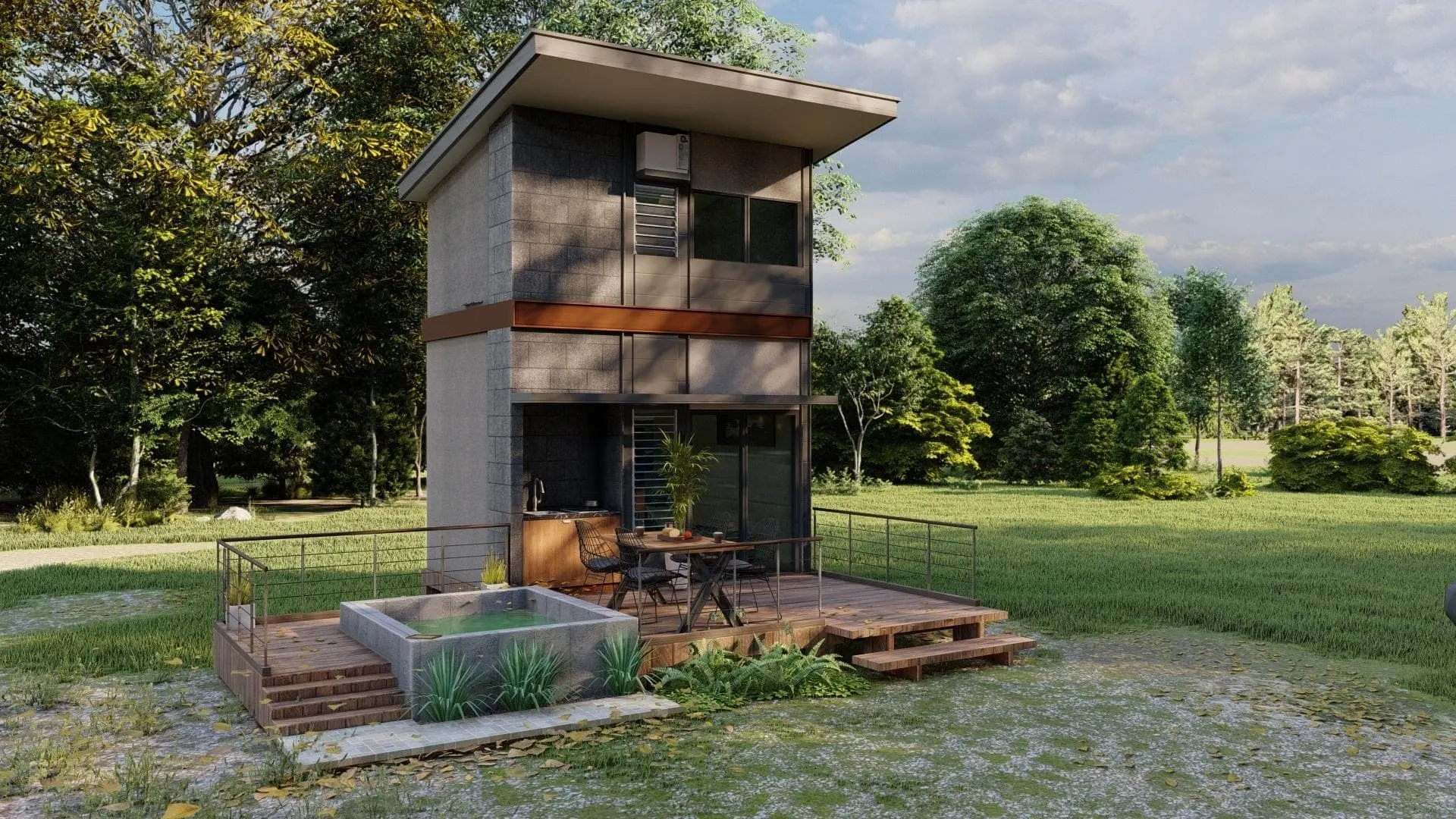
A tiny house will be classified and thus registered differently if it’s static vs mobile (built on a trailer).
How is a Tiny House Different from an RV?
RVs are made to be moved, to travel down the road regularly. RVs are built with aerodynamics and weight in mind. They’re made with lightweight materials while tiny houses are significantly heavier, often better insulated, not specifically built for aerodynamic efficiency, and aren’t usually designed to be moved very frequently, if at all.
What Are the Advantages of a Tiny House vs an RV?
Depending on your needs and desires, there are a number of advantages of a tiny house vs. an RV. Let’s take a look…
Better Insulated Against Weather
Tiny houses tend to be better insulated against the weather than RVs are.
In a tiny house, one can afford to have much heavier insulation, because you’re unlikely to be driving the tiny house as regularly as you would with an RV. Walls, ceilings, and floors can be insulated with heavier materials.
Additionally, the construction of a tiny house is different from that of an RV (often much more like standard house construction), making it easier to heavily insulate a tiny house.
Made With Heavier, More Durable Materials
Similarly, tiny houses can be constructed with heavier, more durable materials. This includes the materials for constructing the walls, ceilings, and floors.
Again, with a tiny house, you don’t have to worry as much about weight, so more durable materials can be used. This allows a tiny house to have a sturdier construction overall. For those that ARE designed to be moved more regularly, the custom approach to tiny house construction allows for the choice of a heavier-duty frame/axles… enabling the heavier weight to be properly supported/carried.
This, of course, is offset to some degree depending on how frequently you intend to move the tiny house.
Usually Completely Customizable
Tiny houses, unless purchased pre-made, are entirely customizable to your specifications.
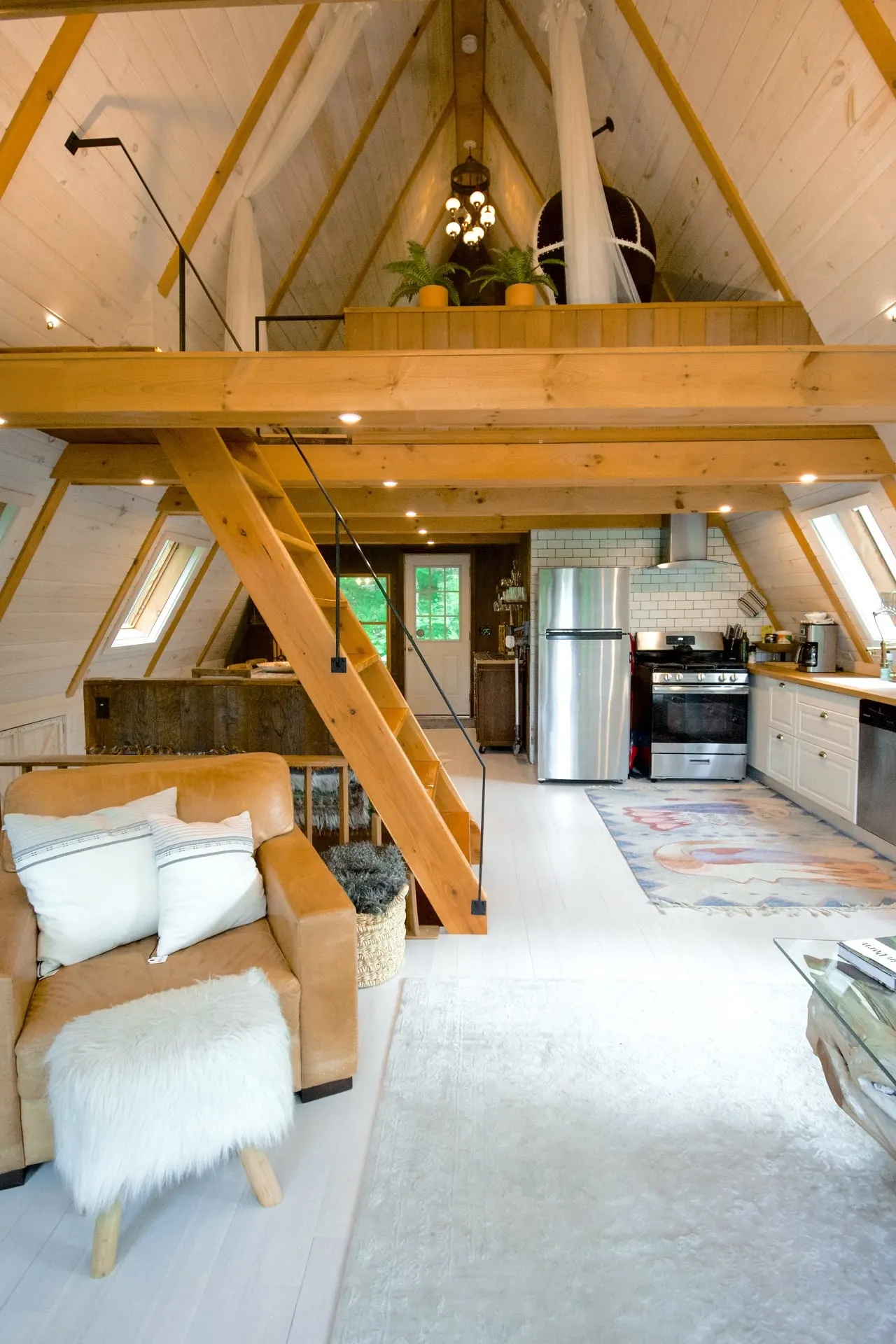
While RVs are generally made to the manufacturer’s specifications, tiny houses are usually completely customizable.
RVs are usually purchased already manufactured. With the exception of upgrades and renovations (or customizations offered by some manufacturers like Newmar), RVs are less customizable than a tiny house would be. Even camper vans that are self-built on a van chassis from scratch are somewhat less customizable than a tiny house because they have a ready-made structure.
Tiny houses can be made according to your own plans as long as they fit properly onto the trailer being used as their “foundation”.
More Like a House
Generally speaking, a tiny house is more like a sticks & bricks house than an RV is.
Tiny houses are built with a structure more similar to that of a sticks & bricks house, only smaller.
RVs are built with the intention that they’ll be driven and moved around regularly, rolling down the highway and over rough terrain in campgrounds and other locations. They’re less like a house by design and built to perform as a mobile unit.
What Are the Advantages of an RV vs a Tiny House?
Again depending on your needs and desires, an RV has many great advantages over a tiny house.
More Mobile
Perhaps the most obvious advantage of an RV vs a tiny house is the greater mobility of an RV.
RVs are made to be moved. For this reason, they’re designed with aerodynamics and lightweight structure in mind, so that they can move down the road at similar speeds to other vehicles on the roadway.
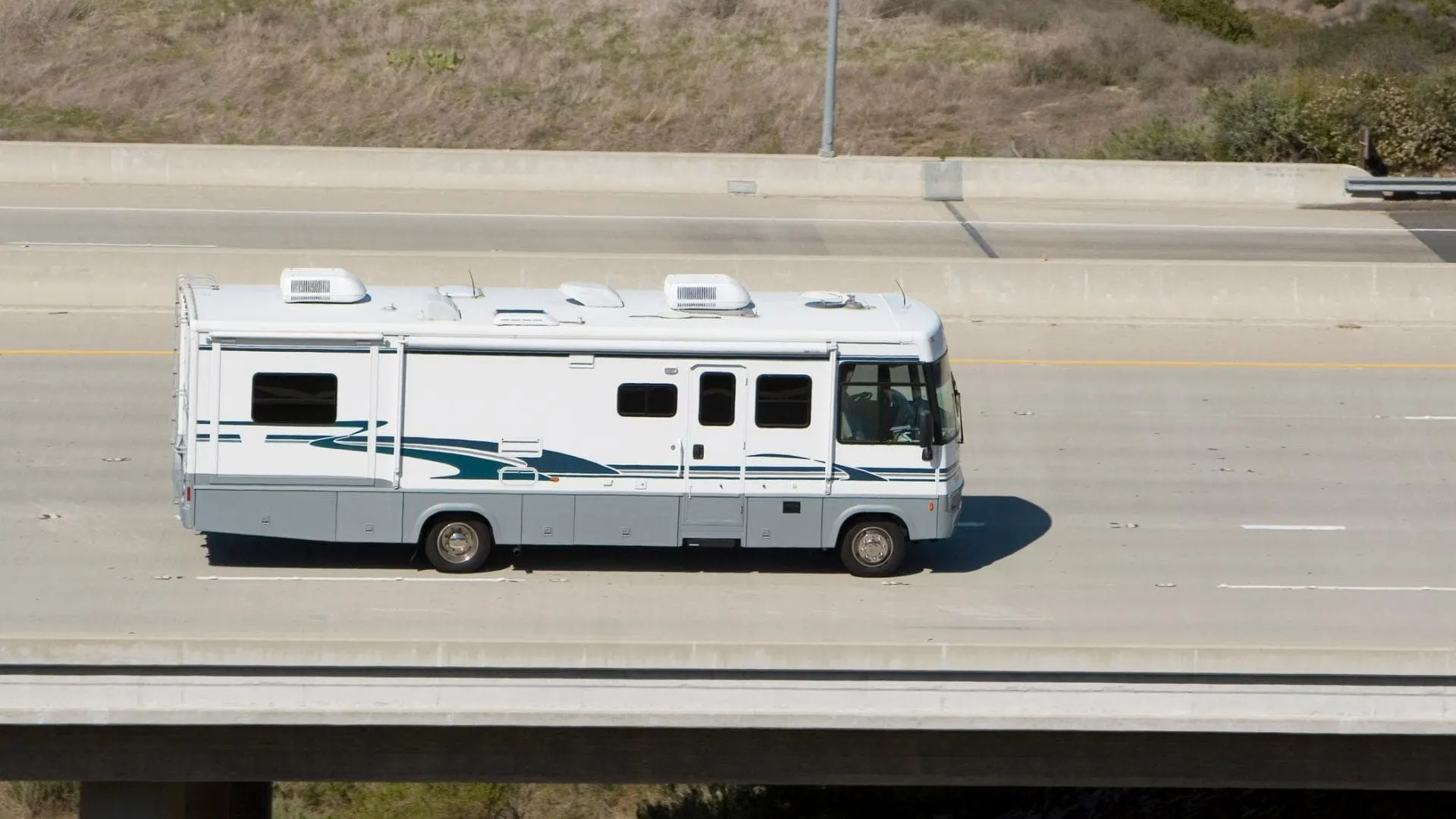
Unlike tiny houses, RVs are designed with aerodynamics in mind as they’re all intended to be mobile.
By contrast, tiny houses are not (generally) built with aerodynamics in mind. They’re typically heavier than most RVs and aren’t designed to be regularly driven or towed.
No Issues With Building Codes
Buying an RV doesn’t require understanding the appropriate building code(s), of course, and in this way, it has a significant advantage over a tiny house.
Many people report that tiny houses, depending on what state you live in, have a number of requirements including adherence to building codes for electricity, plumbing, and more. With an RV, you don’t have to worry about any of this… it’s all been taken care of by the manufacturer (who had to be certified to comply with the RVIA regulations).
Simpler to Insure
It’s far easier to insure an RV than it is to insure a tiny house.
An RV can be insured very simply as a motorhome or a travel trailer, but a tiny house often requires a more complex process. Some tiny houses can’t be insured just with a homeowner’s policy, for example. Some tiny house owners have reported that a tiny house is even more complicated to insure than a regular sticks & bricks house.
To some degree, this is probably due to the fact that tiny houses are relatively new to the market, and insurance companies need to offer a balance in the way they provide coverage. For example, a tiny house not only needs to be insured as a static home but also as a mobile dwelling, at least occasionally.
And unless a tiny house on a trailer is built by an RVIA-certified builder (Recreational Vehicle Industry Association), it cannot qualify for RV insurance policies.
All of this complicates the process of insuring a tiny house far beyond that of insuring an RV.
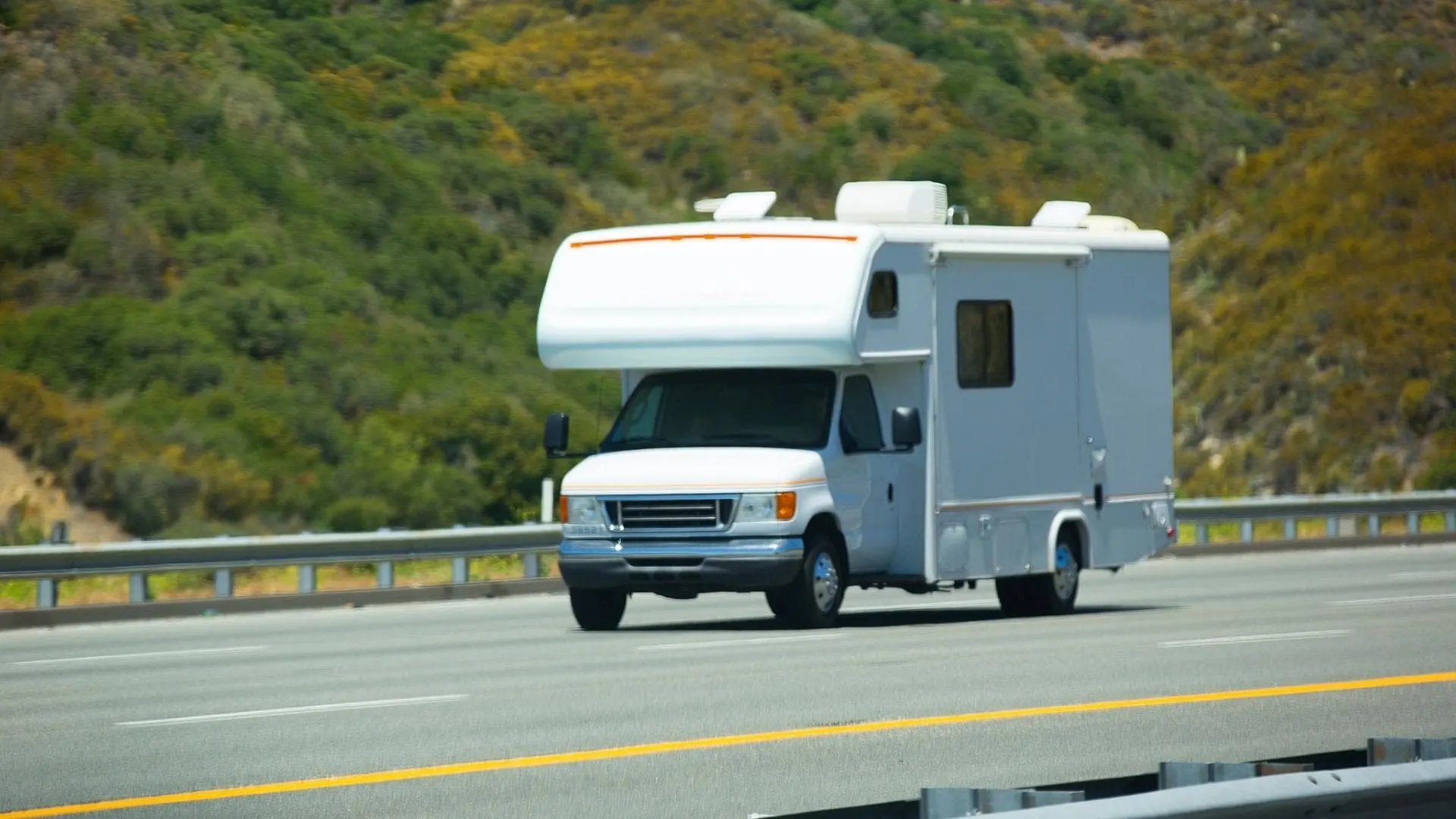
It’s much simpler to register and insure an RV because the classification is clear. Registering and insuring a tiny house is a bit more complicated.
Far Less Complicated to Register
It’s also a far simpler matter to register an RV than it is to register a tiny home on wheels. Not only is the process easier, but the implications are far simpler as well. (In fact, if you can register your tiny house as an RV, everything will be easier. Unfortunately, this isn’t always possible.)
Local and state laws, especially in smaller states, have yet to catch up with the tiny house industry, so there’s a significant gray area governing the registration of tiny houses.
If your rig is registered as an RV, financing is a simpler matter, insurance is a simpler matter, and knowing where you can legally park your RV is much simpler.
For example, you can live in your RV at an RV park or campground, but you may face obstacles if trying to do this with a tiny house on wheels.
An RV Fixer Upper May Be Far More Budget Friendly
A tiny house can be very expensive to produce and to move. If you’re thinking about building a tiny house, renovating a fixer-upper RV may be far more budget-friendly than buying a heavy-duty trailer and building a tiny house from scratch.
A fixer-upper RV can often be bought for very little money, and if the bones are good, can be renovated to your specifications for far less money than would be required to create a tiny house.
For more information, check out our recent post about buying an RV fixer-upper.
An RV Can Be One Unit – Chassis and Cabin Combined
A tiny house on wheels requires a double-axle trailer and a vehicle that can tow the weight of the trailer and tiny house. The trailer would need to have a towing capacity of anywhere from 6,000 to 14,000 pounds (3,000-7,000 per axle). The speed at which you could travel would be limited, as would the terrain over which you could travel.
An RV, on the other hand, can be a combination of chassis and cabin, if desired. While there are a couple of drawbacks, many RVers prefer the convenience of a motorhome that offers a single unit combining both chassis and cabin.
RVs Can Travel to Many More Places
Due to their greater mobility based on their design to specifically be used for travel, RVs are often capable of traveling to many more places than a tiny house on wheels.
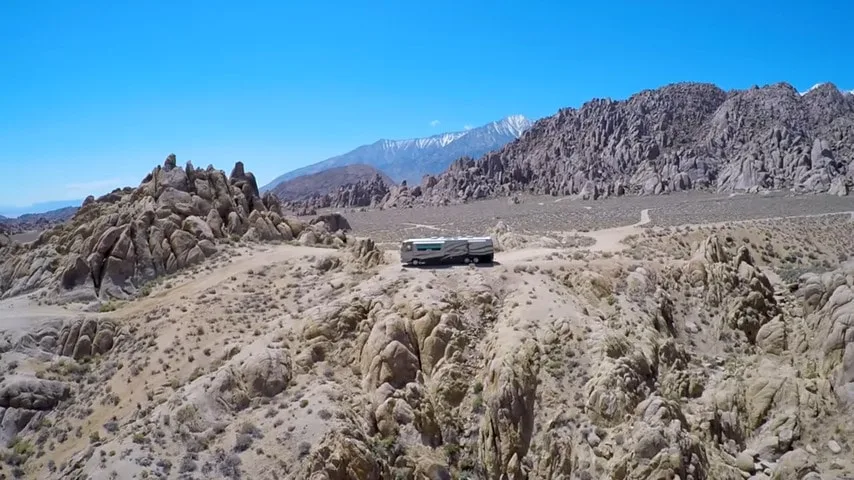
RVs are far more mobile than tiny houses are, and you can take them pretty much anywhere. Here we are in our 43′ diesel pusher camping at Trona Pinnacles. We’re pretty sure a tiny house would be unlikely to make this trip.
Not only can RVs be parked in many more places, but it’s possible to drive or tow them over many types of terrain which is very difficult with most tiny houses.
The ease with which an RV can travel cannot even be compared with what is required to move most tiny houses.
RVs Often Have More Living Space
Believe it or not, RVs often have more living space than tiny houses do. This may come as a surprise, but in fact, the square footage of the living area of some RVs, particularly Class A motorhomes and 5th wheels, is often considerably greater than the square footage of the average tiny house.
With that said, tiny houses often use space very creatively. Designs often include loft bedrooms, stairs with very creative storage areas built-in, and many other creative uses of space that work well in a small living area that doesn’t move frequently (if at all).
Who Would Benefit From Having A Tiny House vs an RV?
In general, people who prefer to embrace living in a small structure that’s stationary (or is very rarely moved) may benefit from a tiny house vs an RV. A primary example would be someone who owns a piece of land where they plan to live for a long period of time, where they’d like to plant a garden, etc.
There are so many amazing plans for tiny houses out there – and some really fabulous tiny homes where people are currently living – and loving it.
People who intend to travel in their tiny living space with any frequency at all, however, would be more likely to prefer an RV.
Geek Out with Us Every Week
Join our newsletter to learn about all things RV-related. Every week we offer free tips, tricks, product reviews, and more to our online community of RVers. So, whether this is your first time on the road or you’re a seasoned expert, we’d love for you to geek out with us!


Jon
Wednesday 14th of February 2024
My small house isn't on wheels, but a slab foundation. It's 546 sq. ft. I like having a home base, but wouldn't mind a small RV to have adventures in.
Gay Traveler (Jason)
Wednesday 14th of February 2024
Happy Valentines Day. ❤️ If I had the money and someone to share the experience, I'd buy a 22ft motorhome. Even a full time RVer doesn't need a 40ft. behemoth. Sometimes a 22ft can be just as as good. 🙂
Neal Davis
Saturday 12th of February 2022
Wasn't that a Bounder pictured in the "More Mobile" section? Although it lacks a picture of a kangaroo, perhaps it is. If so, was it the predecessor to your Mountain Aire? Interesting article. Tiny homes are great ideas and one I probably would pursue were I single, but DW wanted a more extensive house when we built almost 5 years ago. Do like it as a guest cottage, but no one visits us much; certainly not enough to justify building one. Oh well, do enjoy seeing them. Thank you for the articles; this one and all the others. Not as much fun as watching your videos, but I imagine they are much easier to produce. Happy trails and safe travels.
TheRVgeeks
Sunday 13th of February 2022
Hi Neal! No... not a Bounder in that pic (nor ours), but you're right that our first RV was a 2002 Bounder Diesel. And we agree... tiny homes are fun... we're fascinated by them!